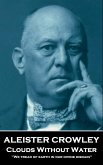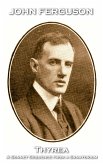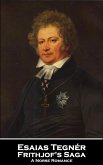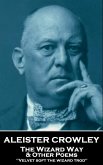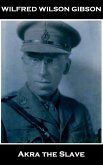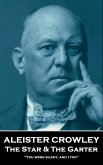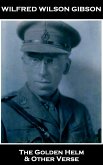Wilfrid Wilson Gibson was born on the 2nd October 1878 in Hexham, Northumberland.
He began to have his poems published as early as 1895, firstly in magazines and periodicals and, from 1903, in collected book form.
After his mother died in 1914 Gibson decided to relocate, firstly to London and, several years later, to Gloucestershire. However much of his poetry still retained his observations and recollections from his time in the North of the country.
During his stay in London he became close friends with the author Richard Marsh and the War Poet Rupert Brooke, indeed he became one of the latter's literary executors upon his untimely death.
He was regarded as one of the brightest poets but also had his poetical critics including such luminaries as Edward Thomas.
He attempted to enlist in the war several times but was declined due to poor eyesight and poor health. Although in 1917 he was accepted but only for work in England and even then not in any military capacity.
It was during this period that the Georgian Poetry movement, of which he was a leading founder, began to coalesce and push itself into critical and public consciousness. Gibson was also a founder of the Dymock poets, a community of writers who before the outbreak of the Great War, lived in the village of Dymock, in Gloucestershire.
He wrote many poetry books before the Georgian Poets disbanded and continued to write and publish for the rest of his life.
Wilfrid Wilson Gibson died on the 26th May 1962, in Virginia Water, Surrey.
He began to have his poems published as early as 1895, firstly in magazines and periodicals and, from 1903, in collected book form.
After his mother died in 1914 Gibson decided to relocate, firstly to London and, several years later, to Gloucestershire. However much of his poetry still retained his observations and recollections from his time in the North of the country.
During his stay in London he became close friends with the author Richard Marsh and the War Poet Rupert Brooke, indeed he became one of the latter's literary executors upon his untimely death.
He was regarded as one of the brightest poets but also had his poetical critics including such luminaries as Edward Thomas.
He attempted to enlist in the war several times but was declined due to poor eyesight and poor health. Although in 1917 he was accepted but only for work in England and even then not in any military capacity.
It was during this period that the Georgian Poetry movement, of which he was a leading founder, began to coalesce and push itself into critical and public consciousness. Gibson was also a founder of the Dymock poets, a community of writers who before the outbreak of the Great War, lived in the village of Dymock, in Gloucestershire.
He wrote many poetry books before the Georgian Poets disbanded and continued to write and publish for the rest of his life.
Wilfrid Wilson Gibson died on the 26th May 1962, in Virginia Water, Surrey.
Dieser Download kann aus rechtlichen Gründen nur mit Rechnungsadresse in D ausgeliefert werden.



